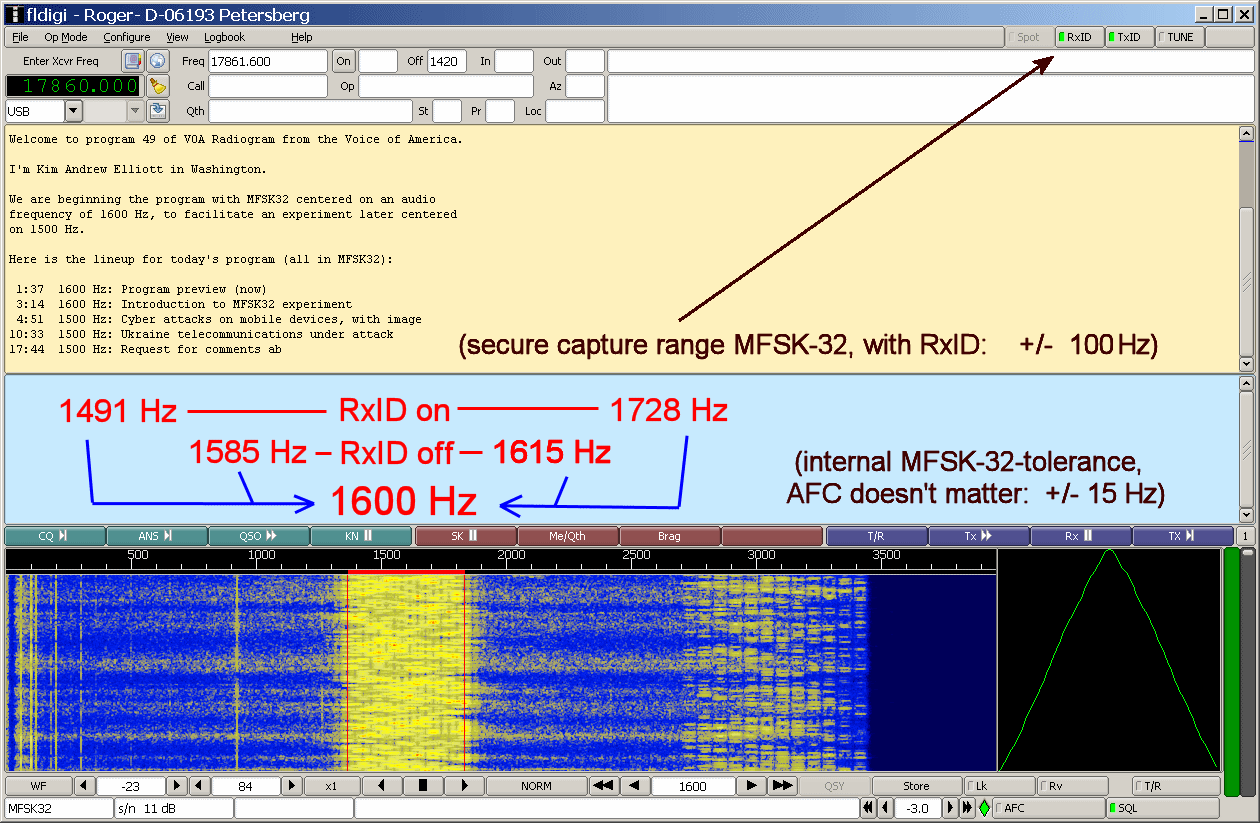
<EOT>
|
www.rhci-online.net/radiogram/radiogram.htm
|
RSID: <<2014-03-08T12:30Z
MFSK-64 @ 6095000+1500>>
<STX>
WINTER SWL FEST
North America's largest gathering of radio listening hobbyists
14-15 March 2014
Plymouth Meeting, Pennsylvania (near Philadelphia)
I will be there to demonstrate decoding of text and images from
shortwave broadcasts.
Information at
swlfest.com
EDXC CONFERENCE 2014
...will take place 19-22 Sept in Saint-Dalmas de Tende and Nice,
France.
Information at
edxcnews.wordpress.com
Thanks to The Mighty KBC
<EOT>
<STX>
Sending Pic:135x79C;

<EOT>
██╗ ██╗ ██████╗ █████╗ ██████╗ █████╗ ██████╗ ██╗ ██████╗ ██████╗ ██████╗ █████╗ ███╗ ███╗ ██║ ██║██╔═══██╗██╔══██╗ ██╔══██╗██╔══██╗██╔══██╗██║██╔═══██╗██╔════╝ ██╔══██╗██╔══██╗████╗ ████║ ██║ ██║██║ ██║███████║ ██████╔╝███████║██║ ██║██║██║ ██║██║ ███╗██████╔╝███████║██╔████╔██║ ╚██╗ ██╔╝██║ ██║██╔══██║ ██╔══██╗██╔══██║██║ ██║██║██║ ██║██║ ██║██╔══██╗██╔══██║██║╚██╔╝██║ ╚████╔╝ ╚██████╔╝██║ ██║ ██║ ██║██║ ██║██████╔╝██║╚██████╔╝╚██████╔╝██║ ██║██║ ██║██║ ╚═╝ ██║ ╚═══╝ ╚═════╝ ╚═╝ ╚═╝ ╚═╝ ╚═╝╚═╝ ╚═╝╚═════╝ ╚═╝ ╚═════╝ ╚═════╝ ╚═╝ ╚═╝╚═╝ ╚═╝╚═╝ ╚═╝
RSID: <<2014-03-08T16:01Z
MFSK-32 @
17860000+1600>>
<STX>
Welcome to program 49 of VOA Radiogram from the Voice of America.
I'm Kim Andrew Elliott in Washington.
We are beginning the program with MFSK32 centered on an audio
frequency of 1600 Hz, to facilitate an experiment later centered
on 1500 Hz.
Here is the lineup for today's program (all in MFSK32):
1:37 1600 Hz: Program preview (now)
3:14 1600 Hz: Introduction to MFSK32 experiment
4:51 1500 Hz: Cyber attacks on mobile devices, with image
10:33 1500 Hz: Ukraine telecommunications under attack
17:44 1500 Hz: Request for comments about shortwave, with image
20:11 1500 Hz: BBG FY 2015 budget request, with Flmsg* table
27:00 1500 Hz: Closing announcements
*Use Flmsg with Fldigi
Please send reception reports to radiogram@voanews.com
And visit voaradiogram.net
Twitter: @VOARadiogram
See you at the Winter SWL Fest, 14-15 March 2014, near
Philadelphia. Information at swlfest.com.
<EOT>
<STX>
On VOA Radiogram, today's experiment will involve the audio
frequency of a received MFSK32 transmission.
We hope that simple, receive-only applications (apps) are
developed to decode MFSK32 on PCs and mobile devices. One
requirement of MFSK is that the receiver and software be tuned to
the precise frequency.
VOA Radiogram is typically transmitted on an audio frequency of
1500 Hz. The audio frequency as received tends to be a few Hz
above or below 1500 Hz.
Would an MFSK32 app require an RxID to ensure that the received
audio frequency is exactly correct? Or is there enough tolerance
in MFSK32 that an RxID is not necessary?
Our experiment now begins...
Please now 1) turn off the RxID in Fldigi and 2) set the audio
frequency to 1500 Hz.
Let us know if you are able to decode the following VOA News
story without the assistance of the RxID.
The story will begin in ten seconds.
<EOT>

|
Audio frequency
now manually
set to 1500 Hz,
+
/ - 15 Hz
no problem roger |
<STX>
VOA NEWS
Matthew Hilburn
February 27, 2014
The amount of malicious software targeting mobile devices is
exploding, according to security firm Kaspersky Lab.
Kaspersky said that in 2013 "nearly 100,000 new malicious
programs for mobile devices were detected." That's more than two
times the number detected the previous year, the company said.
As of January 1, 2014, Kaspersky Lab says it collected 143,211
mobile malware samples.
Rolf von Roessing, the former international vice president of the
Information Systems Audit and Control Association, ISACA, told
information security professionals at the 2013 EuroCACS
information security and risk management conference in London
that a "tidal wave" of threats was emerging against mobile
devices.
Android users are particularly vulnerable, with over 91 percent
of the malware detected targeting the popular mobile operating
system, according to Kaspersky.
"Android is currently more of a target than iOS, but attacks are
happening against Apple mobile devices and, when they are
breached, it is usually fairly serious," said von Roessing.
Russia leads the world, claiming 40 percent of attacks. India was
second with eight percent of attacks, and Vietnam and Ukraine
were tie for third with four percent of attacks.
"Kaspersky's findings are consistent with the numbers being
reported by other security vendors in their annual threat
reports," said Christopher Burgess, CEO of Prevendra a Security,
privacy and intelligence company. "The message? If you are using
a mobile device, keep your operating system up to date, only
download apps from trusted sources, and have in place security
software to protect the content of your mobile device."
Kaspersky said the vast majority of mobile malware was made with
the aim of stealing people's money. This kind of malware
increased by a factor of 20, they said. Most of the malware was
designed to phish, steal bank card information or to take money
from bank accounts.
"Today, the majority of banking Trojan attacks target users in
Russia and the CIS," said Victor Chebyshev, a virus analyst at
Kaspersky in a statement . "However, that is unlikely to last for
long: given cybercriminals' keen interest in consumer bank
accounts, the activity of mobile banking Trojans is expected to
grow in other countries in 2014."
http://www.voanews.com/content/cyber-thieves-increasing-attacks-on-mobile-devices/1860943.html
<EOT>
<STX>
You may now turn the RxID back on.
<EOT>
<STX>
This is VOA Radiogram from the Voice of America
<EOT>
<STX>
MFSK32 image follows: Android logo...
<EOT>
<STX>
Sending Pic:208x125C;

<EOT>
This is VOA Radiogram from the Voice of America...
Ukraine Says Communications Hit, MPs Phones Blocked
Reuters
March 04, 2014
Ukraine's telecommunications system has come under attack, with
equipment installed in Russian-controlled Crimea used to
interfere with the mobile phones of members of parliament, the
head of Ukraine's SBU security service said on Tuesday.
Some Internet and telephone services were severed after Russian
forces seized control of airfields and key installations in
Ukraine's Crimea region on Friday, but now lawmakers were being
targeted, Valentyn Nalivaichenko told a news briefing.
"I confirm that an ... attack is under way on mobile phones of
members of Ukrainian parliament for the second day in row," the
security chief said at a news briefing.
"At the entrance to [telecoms firm] Ukrtelecom in Crimea,
illegally and in violation of all commercial contracts, was
installed equipment that blocks my phone as well as the phones of
other deputies, regardless of their political affiliation," he
said.
Ukrtelecom already has said armed men raided its facilities in
Crimea on Friday and tampered with fiber optic cables, causing
outages of local telephone and Internet systems on the continent.
The Ukrainian security chief did not say whether the new issues
were linked to the earlier raid or a separate tampering incident.
Ukrtelecom said it was working on a response to questions from
Reuters about Nalivaichenko's remarks.
Russia's domestic intelligence service, the FSB, declined to
comment when asked if Moscow was behind the communications
disruptions in Ukraine.
The main Ukrainian government website www.kmu.gov.ua was offline
for about 72 hours after Russian forces seized control of the
peninsula, but went back up early on Monday, said John Bumgarner,
chief technology officer for the U.S. Cyber Consequences Unit.
Bumgarner, whose firm advises companies and government agencies
on how to fend off cyber attacks, said, he is not sure the site
went down as a result of a cyber attack. Still, he said he
believes Moscow has the ability to cause major disruptions using
cyber operations.
"I know they have the ability to do at least as much damage as
they did in Estonia and Georgia," he said.
Estonia suffered a 10-day attack on its Internet services in
2007, which caused major disruptions to its financial system,
during a spat with Moscow over a Soviet-era war memorial, and
Georgia was hit by mass cyber attacks during a brief 2008 war
with Russia over its pro-Moscow South Ossetia region.
Russian authorities denied direct involvement in both attacks,
saying they had no influence over the actions of self-styled
patriotic hackers.
Is Russia holding back?
Much of Ukraine's telecommunications infrastructure was built
when it was part of the Soviet Union, along with what is now the
Russian Federation, and is particularly vulnerable to penetration
by Moscow.
"The Russians have the place completely wired," said Jim Lewis, a
former U.S. foreign service officer and now senior fellow at the
Center for Strategic and International Studies in Washington.
"They are right next door and most traffic has to go through
Russia. That they haven't done more probably reflects their
confidence that they're going to come out ahead and there's
nothing anyone can do about it," Lewis said.
Cyber warfare experts say that while Russia certainly has the
ability to conduct such campaigns against Ukraine, it has yet to
need to use those capabilities.
"This would show the Russians acting with more discretion and
targeting than recently," said John Bassett, former head of the
London and Washington stations of GCHQ, Britain's top secret
government communications center.
"This wouldn't expose any great depth of their technological
capability and they would be keeping the harder stuff back," said
Bassett, now associate at Oxford University's Cyber Security
Center.
Marty Martin, a former senior operations officer with the CIA,
said Moscow likely would only take action to damage Ukraine's
Internet and internal communications systems if hostilities broke
out.
"A lot of times you don't want to shut things down. If you do
that, then you don't get your flow of intelligence. You are
probably better off monitoring it," Martin said.
Experts believe Russia was behind the hacking of a confidential
phone conversation between senior U.S. State Department official
Victoria Nuland and U.S. Ambassador to Ukraine Geoffrey Pyatt,
which was leaked over YouTube last month.
"Russia's strategy is control the narrative, discredit opponents,
and coerce," said Lewis.
http://www.voanews.com/content/reu-ukraine-says-communications-hit-and-mp-phones-blocked/1864073.html
<EOT>
<STX>
This is VOA Radiogram from the Voice of America.
Broadcasting Board of Governors seeks comments on the future of
shortwave broadcasting
The Broadcasting Board of Governors (BBG) Special Committee on
the Future of Shortwave Radio Broadcasting is "seeking feedback
from external experts and stakeholders on their perspectives on
the role of shortwave radio broadcasting as a BBG distribution
platform. We are particularly interested to hear views that
consider the evolving media consumption of target audiences,
changing access to shortwave and other platforms, and the need to
prioritize in an austere federal budget environment."
For the complete notice, see
http://www.bbg.gov/blog/2014/02/28/shortwave-committee-request-for-comment/
<EOT>
<STX>
MFSK32 image follows: Matthew C. Armstrong, member of the BBG and
chairman of the shortwave committee...
<EOT>
<STX>
Sending Pic:116x144C;

<EOT>
<STX>
Shortwave is also specified in the Broadcasting Board of
Governors' fiscal year 2015 budget request...
WASHINGTON (March 4, 2014) - The Broadcasting Board of Governors
(BBG) today announced its FY 2015 budget request, which will help
U.S. international media meet strategic priorities in light of
dynamic global communications environments and current spending
constraints. ...
For the complete BBG press release, see...
http://www.bbg.gov/blog/2014/03/04/bbg-budget-request-tied-to-global-priorities-and-evolving-media-environments/
The press release is accompanied by this summary...
The FY 2015 request provides $716.46 million for International
Broadcasting Operations. Through this appropriation, the
Broadcasting Board of Governors (BBG) funds operations of its
broadcasting organizations, as well as related program delivery
and support activities. The FY 2015 request provides $4.8 million
in Broadcasting Capital Improvements funding to maintain the
worldwide transmission network of the BBG, including the security
requirements of facilities, maintenance, repairs, and
improvements to existing systems.
The BBG is an independent Federal entity responsible for all U.S.
non-military international broadcasting programs. BBG
broadcasting organizations include the Voice of America (VOA),
Radio Free Europe/Radio Liberty (RFE/RL), Radio Free Asia (RFA),
Radio and TV Marti, and the Middle East Broadcasting Networks
(MBN) - Radio Sawa and Alhurra Television.
The BBG mission is to inform, engage, and connect people around
the world in support of freedom and democracy. BBG radio,
television, and Internet programs reach more than 20 6 million
people each week in 61 languages. By exemplifying free media and
free expression, the BBG helps foster and sustain free,
democratic societies. Those societies have proven to be more
peaceful and stable and rarely threaten their neighbors or offer
safe ha vens for terrorists. Nurturing them is thus a national
security imperative, consistent with the President's national
security policy.
The FY 2015 Budget Request includes substantial reductions and
investments that rebalance BBG resources away from legacy markets
(in Europe) and platforms (shortwave and medium wave) and toward
current foreign policy priorities (Africa, Asia, and the Middle
East) and modern media platforms (FM radio, television, and
digital). In keeping with this strategy, the request includes
investments to engage audiences in Africa and Southeast Asia,
expand English learning programs, and increase and enhance
social media presence and products. The request also expands on
BBG efforts to transition to digital transmission technology by
continuing to evolve away from shortwave radio transmissions.
The BBG will reduce language service duplication in some markets,
increasing efficiency and boosting impact, by ensuring
coordinated complementary operations and content where two BBG
broadc asters co-exist. To afford some of the proposed
investments and its transition to digital technology, the BBG
proposes targeted significant reductions to administrative costs
and scale back less effective transmissions.
As part of a multi-year strategy to realize efficiencies and cost
savings in its Satellite transmission program, the BBG included a
$29.9 million funding request through the Opportunity, Growth and
Security Initiative. By providing this funding the BBG estimates
savings of 31% in satellite transmission costs over a seven year
period.
<EOT>
<STX>
Next in Flmsg format is a chart showing the BBG Fiscal Year 2015
Budget Request Overview...
<EOT>
|
<STX> |
|
file:///C:/Documents%20and%20Settings/Roger/NBEMS.files/temp_files/VOAR49_budget_final.html
|
BBG FY 2015 Budget Request Overview |
|
|
|
|
|
($ in thousands) |
FY 2013 Actual |
FY 2014 Enacted |
FY 2015 Request |
Decrease From FY 2014 Enacted to FY 2015 Request |
|
Broadcasting Board of Governors |
713486 |
733480 |
721260 |
-12220 |
|
including... |
|
|
|
|
|
-- International Broadcasting Operations |
702632 |
721080 |
716460 |
-4620 |
|
-- Broadcasting Capital Improvements |
6674 |
8000 |
4800 |
-3200 |
|
-- Overseas Contingency Operations |
4180 |
4400 |
0 |
-4400 |
<STX>
This is VOA Radiogram in MFSK32...
Please send reception reports to radiogram@voanews.com
And visit voaradiogram.net
Twitter: @VOARadiogram
Thanks to colleagues at the Edward R. Murrow shortwave
transmitting station in North Carolina.
I'm Kim Elliott. Please join us for the next VOA Radiogram.
This is VOA, the Voice of America.
<EOT>
RSID: <<2014-03-08T16:27Z
MFSK-16 @ 17860000+1500>>
<STX>
Спасибі за увагу до VOA Radiogram
Thank you
for your
attention to
VOA Radiogram [Ukrainian]
<EOT>
www.rhci-online.net/radiogram/radiogram.htm
|
QTH: |
D-06193 Petersberg (Germany/Germania) |
|
Ant.: |
Dipol for 40m-Band |
|
RX: |
ICOM IC-R75 + IF-mixer |
|
Software IF: |
con STUDIO1 - Software italiano per SDR in LSB/S-AM |
|
Software AF: |
|
|
OS: |
German XP-SP3 with support for asian languages |
|
PC: |
MEDION Titanium 8008 (since 2003) [ P4 - 2,6 GHz] |
DRM-images - received via EASYPAL/DSSTV on 14233kHz/USB (FRG-100 / Dipol for ~12 MHz)
Here are some pictures of CT1EWT [Manuel, de Odivelas, Portugal] received in the last days:
|
|
||
 |
 |
|
|
|
 |
|
 |
 |
|
 |
 |
|
 |
 |
|
|
|
 |
|
|
|
 |
|
|
|
 |
|
 |
||